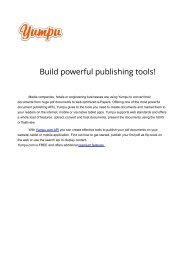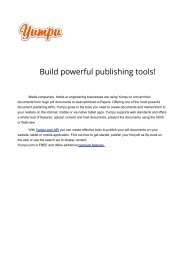test_pdf.pdf
You also want an ePaper? Increase the reach of your titles
YUMPU automatically turns print PDFs into web optimized ePapers that Google loves.
MEETING<br />
TODA<br />
ODAY’S PROLIFERA<br />
ROLIFERATION<br />
CHALLENGES<br />
You also have an army whose whole raison d’être—it’s whole spiritual motivation—has been to con<strong>test</strong> India<br />
over Kashmir and to con<strong>test</strong> India more broadly. So again, if you have to settle that conflict, the people who are<br />
involved in setting the policy of settling it are the ones whose whole life has been spent fighting the battle. You have<br />
an institution that’s consumed for its entire history a disproportionate amount of the resources of the country in<br />
terms of budget and other resources. They’re used to that. If you resolve the conflicts that we’re talking about, their<br />
claim on the national treasury would be greatly diminished, and you’re asking them to kind of voluntarily lead a<br />
process that would lead to cuts in their own budget—not so likely. There are other structural problems that suggest<br />
that as long as the army is dominant, it will be difficult to redress these issues that we want to.<br />
This is not an easy problem to address, but it’s one that the U.S. and the rest of the international community<br />
have avoided historically. And there are lots of reasons why you avoid it. We’re driving the Soviets out of Afghanistan,<br />
so you work with these guys. Now we’re hunting al Qaeda and Musharraf’s in charge of the army and he can<br />
maybe deliver more help in hunting al Qaeda. These are very good reasons, but as long as you don’t deal with the<br />
fundamental challenge of helping to strengthen civil institutions and civil leadership so that it becomes plausible<br />
at some point that you could hand off power to civilians, which is not plausible right now, we’re going to have this<br />
structural problem. To me that is fundamental to addressing these issues.<br />
And, indeed, my fifth and last point is that if even I’m half right about these priorities that I’ve talked about,<br />
what you notice is that the formal nonproliferation regime and the NPT have very little to do with solving the<br />
problem that we face in South Asia. Preventing nuclear use in South Asia is primarily a problem of regional conflict<br />
resolution and domestic political reform. It isn’t constructive or informative to really think about this anymore as<br />
a nonproliferation problem. To think about South Asia primarily in terms of nonproliferation and the nonproliferation<br />
regime kind of focuses you on the wrong set of instruments to actually deal with the real problem there. And<br />
so part of what we need to do is put more onus on the highest level political leadership in this and other countries<br />
to deal with questions of conflict resolution and domestic reform in Pakistan and how you facilitate that, and put<br />
a lot less focus on what people in the nonproliferation bureau are doing to solve the India and Pakistan problem.<br />
I’ll stop there. Thanks.<br />
MR. GALLUCCI: Thanks, George. I want to invite people to come to the microphones.<br />
Q: Thank you very much, Dean Gallucci. I’m Joe Cirincione with the Carnegie Endowment. I thank you. Also,<br />
I don’t have a question; I have a short comment. Bob Einhorn, as usual, I learned a great deal from your presentation<br />
and I appreciate your insights and comments, and I really just have to take issue with one small comment you made<br />
right at the beginning. It was really kind of a throw away line. You just said that all the intelligence experts were<br />
convinced that Iraq possessed chemical and biological weapons and had reconstituted its nuclear program.<br />
I don’t believe that’s true. It certainly isn’t true inside the United States. Not all the intelligence experts<br />
believed that Iraq, for example, had reconstituted its nuclear program. There was strong dissent in the intelligence<br />
agency over that. One entire agency, the State Department, explicitly rebutted that in the national intelligence<br />
estimate. Found no evidence that they had reconstituted. It certainly wasn’t true internationally. The agency with<br />
the most authority in this, the IAEA, went to all the sites in Iraq, found no evidence that Iraq had reconstituted, told<br />
the world this before the war. These were knowable pieces of information. Not all experts thought that. The Arms<br />
Control Association, for example, didn’t think that Iraq had reconstituted its nuclear program. Many people had<br />
concerns, but there was grave doubt about this.<br />
I’m sorry to just pick on that one point, but I think it’s now become an important point in the debate as many<br />
administration officials get caught in their misstatements about Iraq are falling back on this 10-year old’s excuse:<br />
Ma, everybody was saying it.<br />
MR. EINHORN: No, I didn’t say experts. And I agree with you, there’s was a lot of dissent in various<br />
intelligence communities. What I said was it was the prevailing view of the U.S. intelligence community and other<br />
intelligence communities around the world. It happened to have been wrong, but that was –<br />
MR. GALLUCCI: Excuse me, Bob, could you – I’ve got a problem here. What’s the “it” in this thing? What is<br />
it that you think the “it” is in terms reconstituted? I mean, are you saying that it was the prevailing view in the<br />
American intelligence community that the nuclear program of Iraq was reconstituted?<br />
MR. EINHORN: Was that Iraq was actively engaged in reconstituting its nuclear program.<br />
MR. GALLUCCI: This is tricky. (Laughter.) That’s something of an understatement. I was reading the<br />
33<br />
33
















